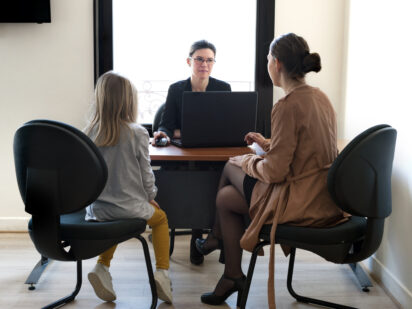There are a variety of emotions and thoughts that occur when going back to school. From being excited to be back on a routine to finding it hard to believe that summer is over, there are stressors, changes and unknowns that impact mental, relational and behavioral health for both parents and teachers when school begins.
While the challenges can be different for parents than they are for teachers, there are tools available that will benefit both groups. “At the very core of good mental health is the tool of mindfulness. This is a term that is tossed around frequently but a simple meaning is being fully aware in this moment of what is going on around me and inside me,” said Virginia Dohms, LPC, LPCC, Trinity Health Behavioral Health.
Effective parenting and education require constant awareness of the children. Meanwhile, according to Virginia, adults can slip into routines or patterns without being mindful of their own thoughts, feelings and actions. Without mindful awareness, parents can find themselves repeating behaviors, thoughts and reactions that they observed as a child.
Taking the time to gather your thoughts and emotions and being aware of how you are feeling can not only help the parents or teachers, but it can help the children too by potentially not impairing learning, social interaction or their overall health.
“There are different paced breaths that help with anxiety, anger and other emotions. There is a wonderful skill called STOP as well. The S stands for stop or slow down, the T stands for take a step back or take a breath, the O stands for observe and the P stands for proceed with caution,” said Virginia.
“When teachers get upset, the kids get upset so using a calm voice and pleasant expression even when they don’t feel like it is going to help the kids. When adults use a harsh voice or an angry face, kids feel even more under threat, and it is harder for them to think and be still. Using a calm voice and pleasant expression helps the kids regulate their emotions.”
Absence of mindful awareness can lead to increased worry, down mood, anger management problems and avoidant and addictive behaviors. Causes that can create absence of mindful awareness are poor sleep, not taking care of your body nutritionally, substance use, not drinking enough water throughout the day, finding that their thoughts are overwhelming and negative and feeling hopeless.
Be assured, there is hope for every teacher and parent who feels stuck. According to Virginia, having at least one social relationship can be the biggest predictor of longevity in a career or in life. Having a listening ear, encouragement and showing empathy are all ways that peers can uplift a teacher or parent who is struggling with their mental health.
For teachers who are struggling, there are things parents can do at home to help make the classroom environment more manageable. “It is important that parents practice mindfulness because if kids go to school not having a meal or being yelled at, they have a far more difficult time at school,” said Virginia.
She added, “not having structure and letting the kids spend all their time on phones can be a problem. They can all help each other by limiting screen time. Parents can also help by making sure their kids get time to play, by spending time with them and making sure they sleep adequately.”
When parents spend time together with their kids, whether that is eating together at a table or playing together, it is a big predictor of the kids doing better in school. Something as simple as playing catch or a game can make the kids feel more connected and help them do better in school.
If you are aware your behavioral health is not where you want it to be, there are always people around you who can help and listen. Please reach out to someone, whether it be a friend, your doctor or a licensed provider in the community. Trinity Health Riverside has licensed therapists, psychologists and medication providers available to help. Being mindful of your thoughts and actions will be beneficial to not only yourself and your peers, but to children and their peers.

